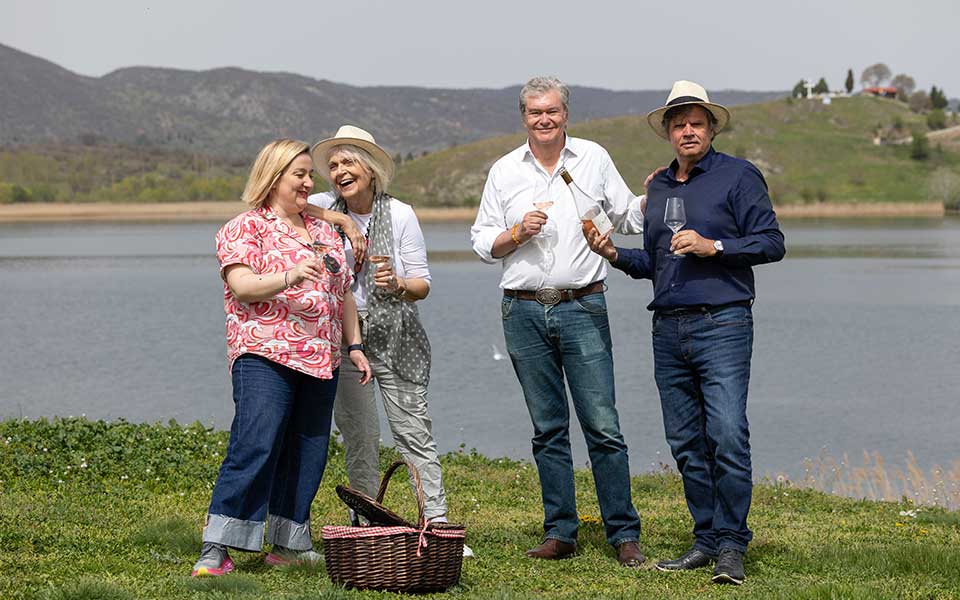I was intrigued by how an American businessman, with no family connections to Greece, ended up in the picturesque region of Amyntaio producing wines. One sunny spring day, I met David Wittig on the shores of Lake Zazaris – which, along with Lake Cheimaditida and Lake Petron, creates the stunning lake district of Amyntaio – to sample wines and explore the trails that led this corporate professional to Greece, where he now crafts some of the area’s finest wines.
To understand the beginnings of Noema Winery, we must go back about twelve years to New York, where we meet Father Alexandros Karloutsos, a key figure in Greek Orthodoxy and Hellenism abroad, renowned by many as the most significant Greek priest in the world! Father Alex encouraged his good friend David Wittig to visit Greece. During a family vacation there, Wittig was approached by Euroconsultants with an enticing investment opportunity. “In 2014, Greece was seen as the pariah of the international financial scene—considered by most as the worst place to invest. However, I tend to think independently and asked myself, ‘Why not?’” Wittig recounted.
This bold decision led him to Athens, though he initially had no plans to enter the winemaking industry; his only exposure to Greek wine had been Assyrtiko from Santorini. His eventual dive into winemaking can be credited to his son, Davis, who introduced him to local varieties and persuaded him that there was a demand for Greek wines in the U.S.
Together, the father-son duo established their winery in Amyntaio. “I was skeptical at first,” David Wittig shared with me, “but now I’ve become quite passionate about it. After my son spent a year away and returned to the U.S. for the Christmas holidays, he fell in love, got married, and is now the CFO of Corporate Banking at Wells Fargo. Suddenly, I found myself solely responsible for the winery. While I remain Euroconsultants’ largest foreign investor and consultant, I’m becoming increasingly involved in winemaking. My experience with many companies throughout my career is different here—there’s a unique sense of collaboration among producers that fosters the international success of Greek wines.”
© Alexandros Avramidis
Why Amyntaio?
I was curious why David chose Amyntaio over other wine regions in Greece. “Father Alex influenced this decision, too,” he explained. “He introduced me to Periklis Drakos, a former export director at Tsantalis winery, whom I managed to bring on board from the beginning. Periklis believes Amyntaio is poised to become Greece’s next major wine region—and he’s absolutely right. With a cool continental climate that boasts 1,600 GDD (Growing Degree Days), which is a complex measurement of temperature impacts on crop growth, along with relatively high elevations of up to 750 meters, we produce the lighter Xinomavro grape. The wines crafted in this remarkable microclimate offer an alternative to the more robust wines of Naoussa. [Editor’s note: Naoussa is another renowned wine region famous for its Xinomavro wines.] Amyntaio’s Xinomavro wines strike a balance between the variety’s structure and a refined aromatic profile.”
The Future Lies in Cooperation
Noema specializes in Xinomavro wines: reds, rosés, and a delightful blanc de noir that I have personally enjoyed. “Greek varieties are the essence of our wines,” Wittig stated. “International consumers seek authenticity. I don’t understand the need to persuade them to try a Greek Chardonnay. Those of us fortunate enough to live here are well aware of the exceptional quality of our local varieties. However, convincing the rest of the world is a challenge. Despite this, I remain optimistic; I believe the continual rise in Greek tourism will help more people discover the charm of our wines.”

© Alexandros Avramidis
The Noema team has some exciting strategies for exporting. “Our international markets are expanding, especially in areas with a significant Greek presence,” Wittig noted. “However, we must reach beyond the Greek diaspora. Our goal is to sell to everyone and strengthen the Greek wine category in shops worldwide with quality wines at competitive prices. We are developing a project called Wine Cellars, made up of small wineries that produce quality wines and wish to export their products. Over time, this will create an attractive export portfolio. Our unique grape varieties and the distinct characteristics of our region, coupled with the commitment and compelling narratives of local winemakers, provide us with competitive advantages to win over international consumers.”
Our conversation, which started by the lake, wrapped up at Aeroino, a lovely wine bar in Florina run by wine enthusiast Giannis Soubasis. While enjoying a drink with winery team member Kyriaki Panagiotou and Periklis Drakos in the bar’s serene courtyard, I asked Wittig if he would make the same decisions again regarding the winery. “Without hesitation!” he answered. “I would absolutely do it again. Sure, I’ve made many mistakes along the way, but to succeed, you must be open to learning.”
Noema Winery produces three wines from Xinomavro grapes: Invicta, a rich red wine with a velvety texture and refreshing aftertaste; Eruption, a vibrant and aromatic rosé that is complex yet delightful on the palate; and Blanc de noir Xinomavro, an elegant white wine made from red grapes, rich in the characteristic aromas of Xinomavro.



